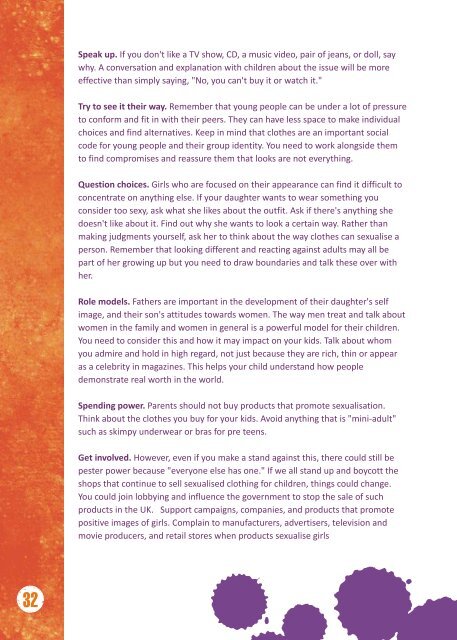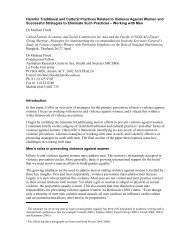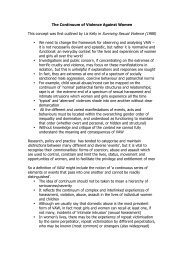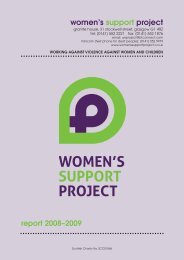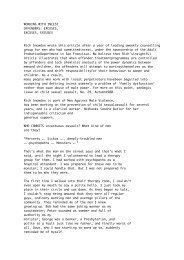AN INFORMATION & RESOURCE PACK FOR PARENTS AND PROFESSIONALS
Pleasure Vs Profit - information pack - numero 2 - Zero Tolerance
Pleasure Vs Profit - information pack - numero 2 - Zero Tolerance
- No tags were found...
You also want an ePaper? Increase the reach of your titles
YUMPU automatically turns print PDFs into web optimized ePapers that Google loves.
Speak up. If you don't like a TV show, CD, a music video, pair of jeans, or doll, say<br />
why. A conversation and explanation with children about the issue will be more<br />
effective than simply saying, "No, you can't buy it or watch it."<br />
Try to see it their way. Remember that young people can be under a lot of pressure<br />
to conform and fit in with their peers. They can have less space to make individual<br />
choices and find alternatives. Keep in mind that clothes are an important social<br />
code for young people and their group identity. You need to work alongside them<br />
to find compromises and reassure them that looks are not everything.<br />
Question choices. Girls who are focused on their appearance can find it difficult to<br />
concentrate on anything else. If your daughter wants to wear something you<br />
consider too sexy, ask what she likes about the outfit. Ask if there's anything she<br />
doesn't like about it. Find out why she wants to look a certain way. Rather than<br />
making judgments yourself, ask her to think about the way clothes can sexualise a<br />
person. Remember that looking different and reacting against adults may all be<br />
part of her growing up but you need to draw boundaries and talk these over with<br />
her.<br />
Role models. Fathers are important in the development of their daughter's self<br />
image, and their son's attitudes towards women. The way men treat and talk about<br />
women in the family and women in general is a powerful model for their children.<br />
You need to consider this and how it may impact on your kids. Talk about whom<br />
you admire and hold in high regard, not just because they are rich, thin or appear<br />
as a celebrity in magazines. This helps your child understand how people<br />
demonstrate real worth in the world.<br />
Spending power. Parents should not buy products that promote sexualisation.<br />
Think about the clothes you buy for your kids. Avoid anything that is "mini-adult"<br />
such as skimpy underwear or bras for pre teens.<br />
Get involved. However, even if you make a stand against this, there could still be<br />
pester power because "everyone else has one." If we all stand up and boycott the<br />
shops that continue to sell sexualised clothing for children, things could change.<br />
You could join lobbying and influence the government to stop the sale of such<br />
products in the UK. Support campaigns, companies, and products that promote<br />
positive images of girls. Complain to manufacturers, advertisers, television and<br />
movie producers, and retail stores when products sexualise girls<br />
32


